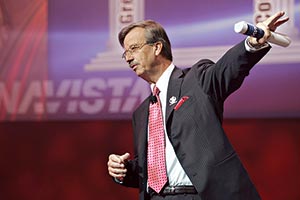Navistar Agrees to Pay $7.5 Million to Settle SEC Suit

Navistar International Corp. has agreed to pay $7.5 million to settle a Securities and Exchange Commission complaint that the OEM misled investors about the environmental compliance of its exhaust gas recirculation, or EGR, method of reducing air pollution from its trucks, the federal regulatory agency said.
In addition, the SEC said that former Navistar CEO Daniel Ustian has been charged by the agency in federal court with “misleading investors and with aiding and abetting violations" of clean air laws.
The securities regulatory agency statement said the Lisle, Illinois-based company and its former leader “failed to fully disclose the company’s difficulties obtaining Environmental Protection Agency certification of a truck engine able to meet stricter EPA Clean Air Act standards.”
The company abandoned its EGR program in 2012, and soon after Ustian left the company. Navistar now uses selective catalytic reduction, the same emissions reduction system used by other OEMs.
David Glockner, director of the SEC’s Chicago Regional Office, added, “We allege that in 2011 and 2012, the EPA repeatedly raised serious concerns with Navistar about its applications to certify an engine using EGR technology and that top Navistar officials knew the company had not succeeded in developing a commercially viable engine that would meet EPA standards. Navistar and its then-CEO misled investors about these difficulties in numerous SEC filings, press releases and public conference calls, and today we seek to hold them accountable for that misconduct.”
"We believe that it was time to put this matter behind us and that this settlement was in the best interests of Navistar and its stockholders. Settling this matter will avoid the expense and distraction of a potential dispute with the SEC and allow us to continue our focus on building and sustaining momentum on behalf of our shareholders," the company told Transport Topics.
In its statement, the SEC said Ustian placed a gag order on company workers to prevent them from telling government officials about the EGR project, which cost the company an estimated $700 million.

